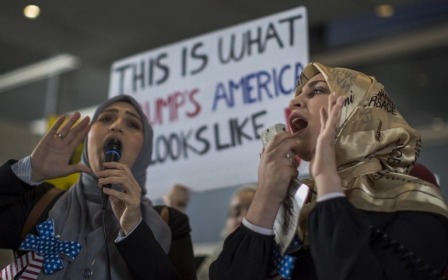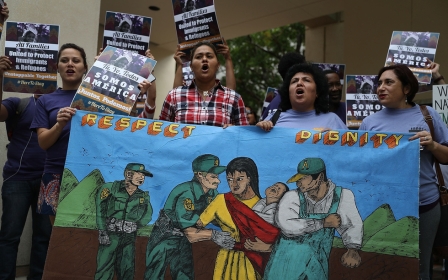Sanctuary city funding debate goes before judge in San Francisco

SAN FRANCISCO, United States - Backed by local governments around the state of California, Santa Clara County headed to federal court in San Francisco yesterday to challenge the constitutional legality of a presidential executive order that would halt federal funding to "sanctuary cities," those deemed safe places for immigrants in the United States illegally.
It is the first such hearing in a country that is seeing an increasing number of lawsuits against the executive order.
The city of San Francisco is also supporting the suit, which was heard in federal court by Judge William H Orrick, an Obama appointee who has served since May 2013. During the hearing, the judge challenged whether the executive branch has the authority to place new restrictions on existing federal funds.
Orrick's decision, which is expected in several days, could set a precedent for similar cases across the country. At the crux is whether federal funding can be withheld from local, county or state governments that refuse to use local resources to enforce federal immigration laws.
More than 400 places throughout the US have some sort of sanctuary policy, although there is no consensus about either the definition or the guidelines. While some locations haven't formally declared themselves sanctuaries, many have publicly stated they won't comply with the executive order. In the Bay Area alone, that includes San Francisco, Santa Cruz, Alameda, Oakland and San Jose.
The state of California has joined Washington, Maryland, New York, Oregon, Massachusetts and Minnesota in challenging the order.
Despite widespread confusion about the scope and impact of the order - Santa Clara alone has said it stands to lose $1.7bn in federal funding - acting assistant attorney general Chad Readler, who represented the Trump administration in the hearing, told Orrick that the executive order would not result in a "massive loss of funds" to governments that fail to comply with immigration orders, and that the city and county were "interpreting the order too broadly".
It was the first such statement about the order from a representative of the Trump administration and the first hint that the order itself might lack gravitas.
"Would you agree that the executive branch can't put new conditions on federal funds already appropriated by Congress?" Orrick asked.
Readler conceded, "Generally, that's true."
The judge then asked: "Bottom line - the $1.7bn in federal funding for Santa Clara is safe?" Readler replied: "Yes, your honour."
Orrick asked repeatedly what the purpose of the order is, and how it would be enforced, as the executive order does not provide a definition of "sanctuary".
When US Attorney General Jeff Sessions recently announced that cities refusing to cooperate with the Department of Justice's efforts to curtail illegal immigration faced losing funding, he specifically mentioned San Francisco, where a young woman was killed by a man who had previously been deported five times and had seven felony convictions.
Shortly before the shooting, the city had released the suspect from custody, despite a request from immigration officials that the man be held until they could retrieve him.
It's a difficult sell in a state whose agricultural, tourism and other economies depend heavily on migrant labour.
More than 34 jurisdictions in California signed onto the court brief, and a bill to name California a "sanctuary state" recently passed the state senate amid controversy and heated debate. That bill, if enacted, would prohibit local law enforcement agencies from using resources for immigration enforcement. The bill now goes to the California Assembly for further consideration.
Karen Ferguson, executive director of the International Rescue Committee's Northern California office, says that although refugees won't necessarily be impacted by sanctuary cities, protecting the designation sends a clear message of inclusivity.
"Sanctuary cities are important in that they are a declaration by a community that the community cares about the inclusivity of all people from all different countries, from all different immigration statuses," Ferguson told MEE. "The important thing is that everybody feel able to access and be supported by the public safety net."
'The president lacks the constitutional authority to cut off funding to states and cities simply because they have lawfully acted to protect immigrant families'
-New York State Attorney General Eric T Schneiderman
The California debate contrasts sharply with one being held in Arizona, where a local sheriff is openly advocating for closer cooperation between local law enforcement and federal immigration officials. Pinal County Sheriff Paul Lamb has crossed-trained his deputies in the federal immigration enforcement programme, which allows them to enforce immigration laws locally.
A study released in January by the Center for American Progress found that sanctuary cities, overall, are safer and wealthier than those with aggressive immigration policies. The study found:
* There are, on average, 35.5 fewer crimes committed per 10,000 people in sanctuary counties compared to non-sanctuary counties.
* Median household annual income is, on average, $4,353 higher in sanctuary counties compared to non-sanctuary counties.
* The poverty rate is 2.3 percent lower, on average, in sanctuary counties compared to non-sanctuary counties.
* Unemployment is, on average, 1.1 percent lower in sanctuary counties compared to non-sanctuary counties.
* While the results hold true across sanctuary jurisdictions, the sanctuary counties with the smallest populations see the most pronounced effects.
"Any attempt by Donald Trump to hijack state and local resources to do the Trump administration's bidding raises serious constitutional questions and threatens the safety of our communities," said California attorney general Becerra, who filed the brief on behalf of the cities and counties.
"California has a sovereign right and responsibility to protect the safety and the constitutional rights of its residents, and that is what we will continue to do."
In an unusual move for a state attorney general, Becerra is setting up an office in Washington DC, a sign that he will continue to fight against federal policies that might hurt California.
Zahra Billoo, executive director of the San Francisco Bay Area chapter of the Council on American-Islamic Relations, said she found the hearing encouraging.
"CAIR is generally appreciative of the county bringing the suit and challenging the Trump administration's concerning threats," Billoo told MEE. "I'm hopeful that the judge is going to agree that the administration has gone too far, and that these reckless threats endanger our communities."
New York State attorney general Eric T Schneiderman has also vowed to fight the executive order, stating: "The president lacks the constitutional authority to cut off funding to states and cities simply because they have lawfully acted to protect immigrant families - as described in the legal guidance my office issued last week. Local governments seeking to protect their immigrant communities from federal overreach have every right to do so."
Following orders from the administration, the federal Immigration and Customs Enforcement (ICE) agency briefly issued a weekly report of the cities and towns throughout the country that failed to comply with federal immigration orders, known as the "Declined Detainer Outcome Report".
Issued from 28 January until 17 February, it contained several towns included in the joint lawsuit. It has been suspended as ICE "continues to analyse and refine its reporting methodologies".
New MEE newsletter: Jerusalem Dispatch
Sign up to get the latest insights and analysis on Israel-Palestine, alongside Turkey Unpacked and other MEE newsletters
Middle East Eye delivers independent and unrivalled coverage and analysis of the Middle East, North Africa and beyond. To learn more about republishing this content and the associated fees, please fill out this form. More about MEE can be found here.




